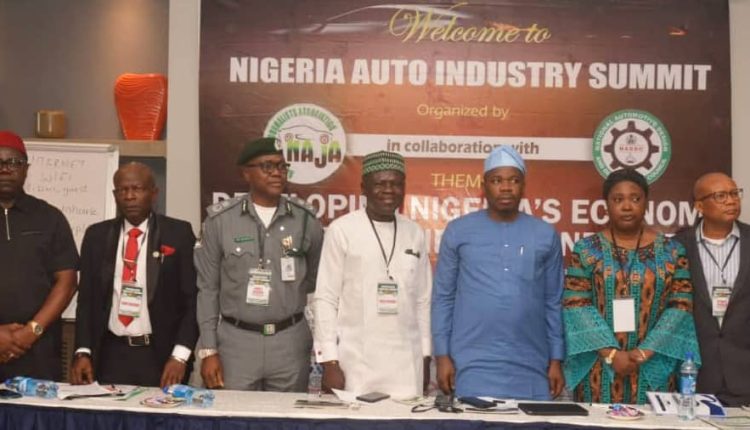Auto sector: Minister, NADDC, NAMA, others harp on collaboration, infrastructure, legal framework

Maureen Aguta
Nigeria’s automotive stakeholders have stressed the need for unambiguous legal frame work and sustained infrastructure development as part of measures to tackle critical challenges confronting the sector.
Speaking at the maiden edition of Nigeria Auto Industry Summit (NAISU), held in Lagos on Thursday, the stakeholders urged the Federal Government to without any further delay create an enabling environment for the sector to thrive.
Organised by Nigeria Auto Journalists Association (NAJA) in collaboration with the Nigerian Automotive Design and Development Council (NADDC), with the theme: “Reviving Nigeria’s Economy Through The Auto Industry.“
Leading the conversation, the Minister of Industry, Trade and Investment, Doris Uzoka-Anite assured stakeholders that the Federal Government is committed to creating an enabling environment for the automotive sector to thrive.
Represented by Deputy Director, Industry Development Department, Mrs. Olumuyiwa Ajayi-Ade, the Minister said: “We have introduced several policies and initiatives aimed at supporting this industry.
The Minister acknowledged challenges in the sector, such as inadequate access to finance, limited local content in vehicle production, and the need for policy consistency.
According to her, the Federal Government is committed to working with industry stakeholders to overcome challenges and create a conducive environment for growth.
The Minister said: “The automotive sector holds the key to reviving Nigeria’s economy and positioning our nation as a hub for automotive manufacturing in Africa.
“With the right policies, investments, and collaborative efforts, we can transform this sector into a significant driver of economic growth and development.
“I urge all stakeholders; government agencies, private sector players, financial institutions, and development partners to join hands in this endeavour.
“Together, we can build a vibrant and sustainable automotive industry that will drive Nigeria’s economic revival and ensure a prosperous future for all”
In his submission, the Director General, National Automotive Design and Development Council (NADDC), Joseph Osanipin said Nigeria’s reliance on imported cars is putting pressure on the nation’s foreign exchange market and hindering job creation.
Osanipin said Nigeria must strive towards a future where it becomes not just a consumer, but also a producer of high-quality automobiles.
According to him, the percentage of auto industry contributions to the GDP and job creation is still very low compared to African countries like Morocco and South Africa.
While encouraging interested individuals and corporate bodies to invest in local production of vehicles and spare parts, Osanipin said NADDC was committed to supporting research and development initiatives that will lead to the creation of new technologies and solutions tailored for the Nigerian market.
“We need to support locally-made vehicles. By choosing Made-in-Nigeria cars, you are investing in the future of our nation. Let us consume what we produce and produce what we consume,” he said.
Also speaking, Wale Adeniyi, comptroller-general of the Nigeria Customs Service (NCS), said the proliferation of used cars in Nigeria was further weakening the naira and straining the local manufacturers in the country.
“The Nigerian car market is dominated by used vehicles imported all across the world. These vehicles are often cheaper and more affordable than their brand-new counterparts, and sometimes the locally assembled vehicles.
“These abundant and affordable used vehicles dampen demand for new locally assembled cars, and hinder growth in the domestic industry,” said Adeniyi represented by the Customs Area Controller of PTML Command, Comptroller Kenny Daniyan.
He said the Nigeria Customs Service currently enforces an import prohibition on vehicles older than 15 years as contained in schedule three of the common external Tariff, from entering Nigerian car markets as a way to reducing the import of used cars.
“This is tailored at further supporting and encouraging growth in the Nigerian Automotive Industry.”
Executive Director, Nigeria Automotive Manufacturers Association (NAMA), Mr. Remi Olaofe, Urged the government to revive tyre, battery, and glass manufacturing as a precursor to reviving local manufacture of key components.

